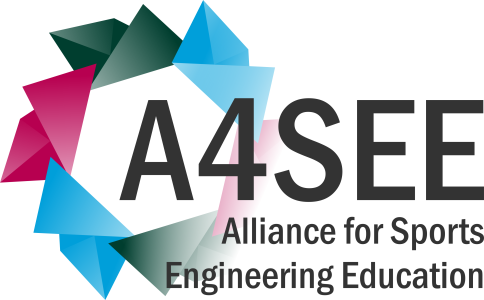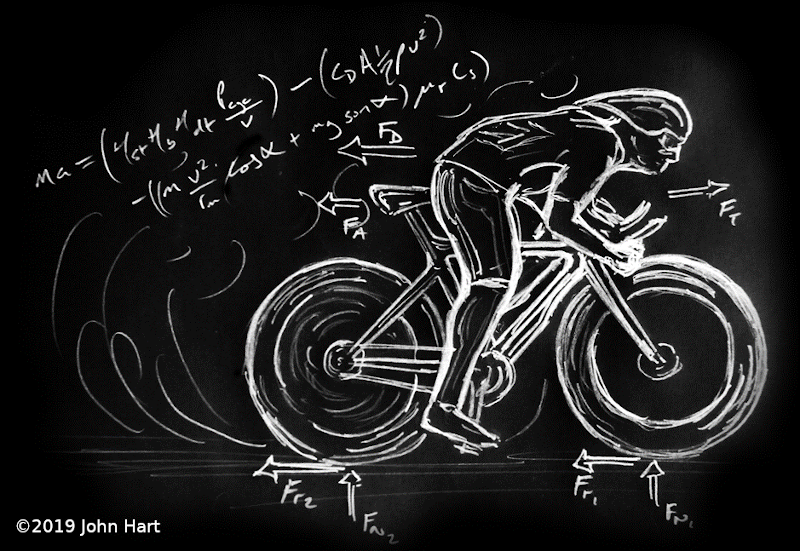
Group photo at the Apeldoorn velodrome in 2022.
Special Topics in Sports Engineering is an inter-university course for Master students in Mechanical Engineering, Movement Sciences, Sport Sciences, and other related MSc programs. The course is organized as a two-week intensive course and comprises lectures, demonstrations, practicals, hands-on research, and a final field test. The course is taught by various experts from different scientific domains.
The course is organized around a basic theme relevant for sports engineering and this year's theme will be "maximizing cycling performance". During the course students will work out what aspects determine cycling performance, and collect data (through experiments or literature research) that are needed to develop and feed a simulation program for the estimation of the optimal bicycle–rider combination and the maximal performance humanly possible. The course's final activity will be a test ride to quantify the differences between actual performance and predicted performance.
In this course, students will have to answer the question:
Given a particular bike, what will be your own predicted time over a given distance and track and how well does this match reality?
The prediction should be based on a power-based simulation model of cycling and the relevant bicycle and rider dependent parameters, which have to be collected experimentally. Answering this question will require insight in relevant parameters, but also collecting these parameters, for each individual student with his or her individual bike. The bike in question can be chosen freely and might therefore be a top-end racing bike as well as your grandmother's shopping bike.
Video highlights from the 2023, 2019, 2018, 2016 courses are below:
Study Goals
After following this course, students should understand the complexity of maximizing sports performance and the importance of the inclusion of material–athlete interaction. More specifically, students should be:
- Familiar with the power equation concept and be able to apply this to cycling;
- Have knowledge of methodological aspects of sports research, in particular error propagation, man–machine interaction (closed loop complexity), measurement techniques, internal and external validity.
- Have insight in the organizational and psychological complexities of sports innovation.
- Able to measure key parameters needed for power equations, related to their own field and have experience in the measurement of key parameters in adjacent fields;
- Able to provide a cycling performance simulation program with the parameters necessary to evaluate performance on a realistic level;
- Able to collect and present to fellow group members, data on parameters for such a simulation program.
- Present research findings through an individual portfolio, and a group presentation/poster/brief oral.
Dates
2026 Dates
The course will occur over the two weeks of June 29, 2026 to July 10, 2026 with activities scheduled throughout the day from Monday to Friday each week. The course will be in person in Delft!
If there are not enough registered students, it is possible that the course will not be taught in 2026, so spread the word!
Credits
The course is designed as a 3 EC course, but packed into two weeks. Some of the participating universities will award you the credits; ask your coordinator for more information.
Registration
Students will register with the coordinator at their home university. There are a guaranteed number of slots for students from each of the participating universities. Excess students will be placed on a waiting list. Slots will be filled on a first come, first serve basis.
The registration deadline is March 1, 2026.
Registration timeline:
- February 1, 2026: Registration is open.
- March 1, 2026: Registration deadline.
- April 1, 2026: Students are informed of their team placement and asked to confirm.
- May 1, 2026: Final confirmation of participation.
Reach out to your university's coordinator to find out how to register:
| University | Slots | How to Register | Coordinator | |
|---|---|---|---|---|
| Delft University of Technology | 20 | Email coordinator | Nicole Kleven | N.J.M.Kleven@tudelft.nl |
| Sheffield Hallam University | 10 | Email coordinator | John Hart | john.hart@shu.ac.uk |
| Aalborg Universitet | 5 | Email coordinator | Mark de Zee, Pascal Max Madeleine | mdz@hst.aau.dk, pm@hst.aau.dk |
| Technische Universität Chemnitz | 5 | Email coordinator | Stephan Odenwald | stephan.odenwald@mb.tu-chemnitz.de |
| FH Technikum Wien | 5 | Email coordinator | Stefan Litzenberger | litzenberger@technikum-wien.at |
Course Organizers
Communication
We will make use of the Microsoft Teams platform for all course communication and hybrid lectures. We will use a "Team" named "Special Topics in Sports Engineering 2026" for announcements, hybrid lectures, and channels will also be available for your group to use for group work. Hopefully, all communication about the class will stay within the team to simplify working across multiple universities and countries. Steps to getting access to the team:
- Download and install the Microsoft Teams software (free for use on all major desktop platforms).
- If you are TU Delft student or employee, open Teams and log in with your TU Delft netid. Once logged in, you should see the "Special Topics in Sports Engineering 2026" team under "Teams" in the MS Teams application. You are done.
- If you are not with TU Delft, create a free Microsoft account then check the email you registered with for the course for an invitation to the team. The subject should be something like "You have been added as a guest to Delft University of Technology in Microsoft Teams".
- Click the "Open Microsoft Teams" link in the email and sign into MS Teams with your Microsoft account. You should see the "Special Topics in Sports Engineering 2026" team under "Teams" in the MS Teams application. You are done.
It is important to access the team the week before class and report any issues to the teaching assistant for access help. We have had some connection issues in the past.
If you are not registered for the course but would like to join the live lectures, send an email to the teaching assistant with a request to be added.
To join the live lectures and activities:
- Open the Microsoft Teams application.
- Select "Teams" and then "Special Topics in Sports Engineering 2026".
- Select the "General" channel (if not already selected).
- Wait for the video meeting to start and select "Join" when the meeting is active.
Lecturers may upload any files for the students to the General channel's "Files" "Class Materials" folder. All members of the MS Team will have access to the files.
Assessment
All assessment documents should be submitted as a PDF to the "Files" area of your group's private channel in the "Sports Engineering 2026" MS Team.
Intermediate Reporting
At each reporting activity in the schedule (one for each assignment) each group will be expected to submit a PDF written document with 2 pages of content max and make a (strictly) 3 minute presentation to the class. At least two scientific literature resources should be used and cited in each of these reports. The title, author list, and bibliography do not count against the page limit. Submit a PDF of the report and a PDF of the slide deck to the "Files" section of your group's MS Team channel by the end of the reporting activity period. The instructors will provide unstructured written and verbal feedback to your group before the next assignment is introduced.
Final Report
Each group should submit a PDF final report with maximum of 6 pages of content including methods, results, and discussion based on the two intermediate reports and your final work by 23:59 Friday July 17th, 2026. At least six scientific literature resources should be used and cited. The title, author list, and bibliography do not count against the page limit.
Final Presentation
Each group will present a maximum 6 minute presentation the afternoon of the last day. The presentation will be followed by 2 minutes of Q & A. You should present your model predictions and its comparison to the measured race duration to the class, including the procedures and results of assignments 1 & 2 on which your predictions are based. Submit a PDF of the slide deck along with your final report and peer review.
Peer Review
Each student in the class will submit a structured review of contributions of yourself and your group members alongside the final report one week after the last day of the course. A form will be provided for this.
Grading
For the students collecting course credit, the grade will be either a "pass" or a "fail". To pass your group needs to receive a "pass" assessment on each report, you must participate in the group presentations, and each student should receive a satisfactory peer review score from their group members.
Partners
Special Topics in Sports Engineering was part of A4SEE a Erasmus+ Knowledge Alliance project funded by the EU.

Participating Universities

|

|

|

|

|

|
